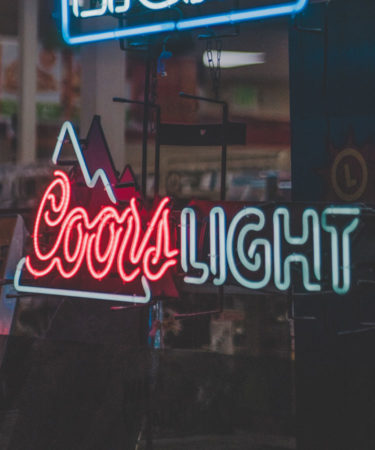“Cold as the Rockies.” We’ve all heard it. Or, maybe we haven’t? According to a recent report in AdAge, MillerCoors is doubling down on its “World’s Most Refreshing Beer” tagline this season with new, “Cold Activated” commercial spots. The reason? Millennials might not be familiar with the concept.
After the failure of Coors Light’s “Climb On” campaign, which featured mountain-climbing, sporty types overcoming physical adversities, the “new” approach takes Coors Light back to the bar and the game.
“We are going back to truly being the ‘World’s Most Refreshing Beer,’ rooted in our ownership of cold,” Ryan Reese, Coors VP, wrote in an email. “When the mountains turn blue, it means Coors Light is at the perfect temperature to bring refreshment. And younger consumers, believe it or not, didn’t know that. When we asked, they said really? That’s so cool. And they didn’t know, because we stopped telling them.”
I happen to remember when the first round of cold-activated cans hit the marketplace, so I guess I’m at an advantage over my millennial peers who have apparently been calmly watching their beer cans change color without a second thought. Stay curious, folks!
The commercial spots have been running since September, AdAge reports. One features a sweaty man at a bar; another features a sweaty gal at a tailgate. Obviously, they both need a cold one.
Or do they? Are today’s younger beer consumers drinking beer because it’s cold? According to Nielsen, Coors Light case volume fell 6.3 percent in the year-to-date period ending November 24. It lost 0.4 market share points during that time, too. Bud Light, meanwhile, lost a full market share point during that time.
My feeling is, if younger drinkers are choosing Coors Light, it’s because of its price tag, not its temperature.
Maybe the gimmick will nudge a millennial or two to choose Coors Light over Bud Light (it would certainly make a more appealing Instagram story), but if craft beer market share is what Coors is after, cold cans aren’t going to cut it.
Craft Brewer Definition Changes Again, Is Meaningless
This week, the Brewers Association (BA) officially changed its definition of “craft brewer.” The previous definition included three descriptive adjectives: small, independent, and traditional. Now the BA ditched that last one, replacing it, curiously, with a noun: “brewer.”
The shift away from “traditional” means, in literal terms, that to qualify as a craft brewer for the BA, you simply need to possess a Brewer’s Notice from the Alcohol and Tobacco Tax and Trade Bureau (TTB), and to make (some, any) beer. A previous stipulation reading “flavored malt beverages (FMBs) are not considered beers” has been removed. (Ahem, Boston Beer.)
In a smart move, the BA preemptively answered many of the questions that spring to mind for beer nerds like me. I’ll paraphrase a few:
How can you say that a company primarily producing cider and spiked seltzer is more of a “craft brewer” than a brewery that happens to have a 30 percent stake owned by a larger beverage alcohol company?
What about private equity?
And my personal favorite: Is the craft brewer definition meaningless?
I hate to say it, but it kind of is. The craft brewer definition has changed four times in 12 years. It has increased the meaning of “small” to allow certain breweries (ahem, Boston Beer, again) to maintain their “craft” labels. It allows acquisitions and funds from some corporations (private equity and banks), but not others (big brewers). Now, it’s changing the very definition of beer itself, allowing once-prohibited adjuncts in more recipes; and encouraging FMB, wine, mead, and cider producers to become “craft brewers” at any cost.
Yes, it makes sense that an organization’s parameters can change as its industry evolves. Yes, supporting small businesses, consumer choice, quality, and creativity are important. Small and independent are guideposts I can get behind. But a “brewer” is not defined by who pays their salary. If a spiked seltzer entrepreneur with a brewer’s license is more of a craft brewer than, say, Tonya Cornett at 10 Barrel Brewing, then this definition is inadequate.
“Craft” lost its meaning a long time ago. Is “brewer” going to become a nonsensical term, too?
Deschutes Brewery Cuts Dozens From Its Workforce
Deschutes Brewing laid off nearly 10 percent of its workforce last week, the Bend Bulletin reports. Reasons for the layoffs include missed growth projections, and Deschutes’ decision to pull back on plans to build a new facility in Roanoke, Va. Deschutes is currently the 10th-largest craft brewery in the U.S., according to the Brewers Association.
“We have made the hard decision to reduce staff across sales, marketing and operations by 10 percent to match our sales volume,” Michael LaLonde, Deschutes CEO and president, said. “This decision was extremely difficult to make, but necessary for the brewery given current market conditions and trends.”
Deschutes is not alone. Several top breweries — New Belgium, Green Flash, Ninkasi, and Avery — have laid off large numbers of employees in recent months. Big Beer is facing the same problem, with Anheuser-Busch and MillerCoors cutting hundreds of positions this year.
No brewery can escape the dual pressures of corporate beer and competition from local startups. This is particularly difficult for brewers like Deschutes, a 30-year-old brand in a beer-friendly state whose number of breweries has doubled since 2011.
I see two options for mid-size, regional breweries like Deschutes to survive while maintaining their BA-approved independence. One, stop prematurely trying to expand by opening more brewery locations and sending more salespeople out into new markets. It’s clearly not working. Two, team up with a brewery group, be it a private equity-funded collective like CANarchy or an IPO like Boston Beer, that can guarantee some length of sustainability. The more breweries like Deschutes try to expand without the means, the weaker their reach will be.
